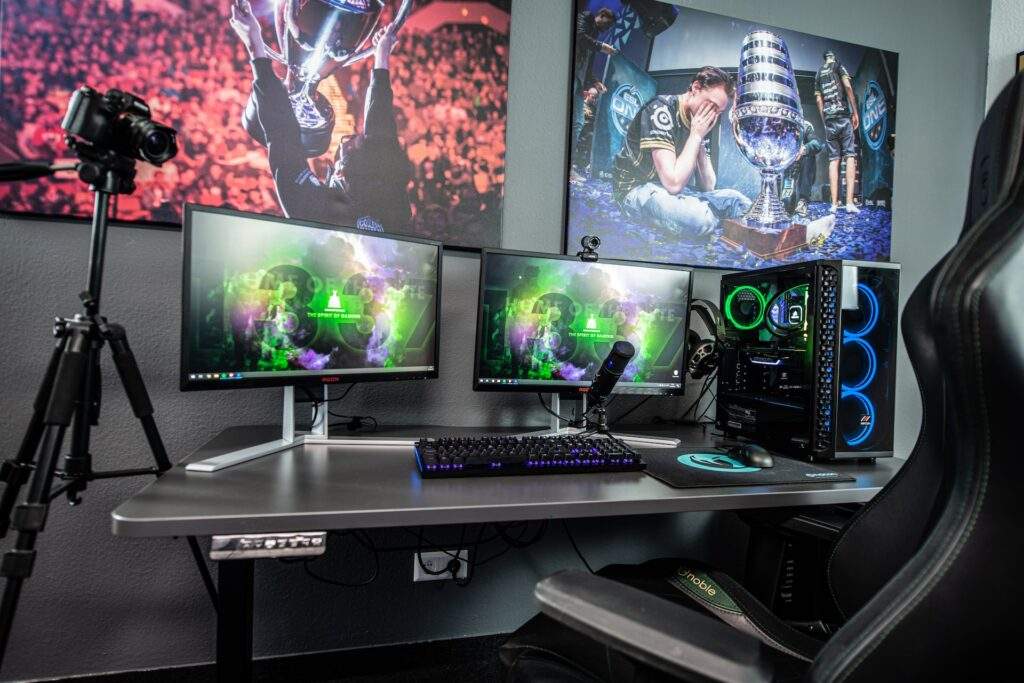Welcome to casinotips.io! In this article, we’re going to delve into the impact of gaming on mental health, exploring both the positive and negative effects that gaming can have on our well-being. As gaming continues to evolve and gain popularity, it’s important to understand how it affects our mental health and to promote a healthy and balanced gaming experience. Join us as we explore the intricacies of gaming and its impact on mental well-being.
In recent years, the gaming industry has taken steps to address the issue of mental health. Most modern games include options to help players adjust brightness levels, sound, and other settings to ensure they have the best experience possible. Many companies have also added content advisories that inform players of the type of content their game contains. Moreover, more developers are incorporating support systems into their games, including safe online chat rooms and community forums that promote positive conversations. While it’s important to be aware of the potential risks of gaming, such as addictive-like behaviors, it’s encouraging to see the industry take steps to proactively protect the mental health of its players.
In addition to these steps, companies are also introducing reward systems that incentivize safe gaming behavior, such as logging out when not in use and taking breaks between gaming sessions. This not only encourages players to practice healthy gaming habits but offers them rewards for doing so. Moreover, developers are beginning to incorporate mental health-centered storylines into their games to normalize conversations around mental health and provide players with positive narrative outlets for tackling related issues. As we move forward, it’s clear that the gaming industry is paying attention to the mental health of its players and is investing in initiatives to provide a safe and healthy gaming environment for everyone.

1. The Positive Effects of Gaming on Mental Health:
Discuss the positive impact of gaming on mental health. Explore how gaming can provide stress relief, relaxation, and escapism from daily life. Discuss the potential for gaming to enhance cognitive skills, problem-solving abilities, and creativity. Highlight the social benefits of gaming, such as fostering friendships, community engagement, and teamwork in multiplayer games.
In addition, gaming can be utilized as an outlet to cultivate greater self-discipline and perseverance. Through the challenge, gamers can learn to evaluate their chance of success, measure their strengths and weaknesses, develop effective strategies for victory, and stay focused and motivated. Finally, gaming can also give a sense of accomplishment, satisfaction, and a sense of progress. All of these benefits can contribute to a healthier psychological and mental state.
Additionally, online gaming provides an excellent platform for gamers to interact and collaborate with others, with opportunities for social bonding and networking. Online gaming also gives gamers the flexibility to play their favorite games anytime, from any location. This increases the capacity for connection, making gaming a powerful tool for engaging in meaningful, positive interactions with others, while learning how to overcome the challenges that accompany it.
Online gaming is also seen as a form of entertainment, allowing players to inactively view others’ gaming experiences or even engage in competition. Game tournaments offer a range of incentives and rewards, which are often based on skill levels and the ability to work together. This can provide a great sense of accomplishment and camaraderie among the players who might not be able to come together otherwise. Online gaming also serves as a form of escapism which could help individuals de-stress. Escapism can be seen as a necessary mental break away from reality to take some time from life’s stresses. Because of this, gaming can be seen as a beneficial way to boost mental health.
2. Gaming Addiction and its Effects:
Address the potential negative effects of excessive gaming and gaming addiction. Discuss the signs and symptoms of gaming addiction, including withdrawal from real-life activities, neglect of personal responsibilities, and detrimental effects on relationships. Explore the impact of gaming addiction on mental health, including increased anxiety, depression, and social isolation. Highlight the importance of recognizing and seeking help for gaming addiction.
Furthermore, discuss the options for treatment and support for individuals with gaming addiction. This can include therapy, lifestyle changes, support groups, medication, mindfulness techniques, and parental intervention. Emphasize the need for responsible use of technology, such as setting weekly limits on gaming, deleting unhealthy online relationships, and respecting the privacy of others. Finally, encourage family members and loved ones to proactively engage with the individual in question to help them manage their gaming habits and provide them with the necessary guidance and support to lead a happy and healthy life.
Where addiction has been identified, it’s important to reach out for help sooner rather than later. There are many professionals, such as clinical psychologists, psychiatrists, and addiction counselors, who specialize in the treatment of gaming addiction and can provide individualized treatment plans tailored to the individual’s needs. During the process of seeking help, it is important to identify the sources of stress in the person’s life and develop new coping strategies to reduce reliance on gaming. Involvement of the family throughout the process is essential to help the individual manage their gaming habit, create more positive behaviors, and establish a healthier lifestyle.
Additionally, self-help books and online support groups are available to provide practical advice for managing and overcoming gaming addiction. Professional help should be sought when the person has difficulty monitoring their usage and their addiction is causing them to perform poorly in other areas of life such as work, school, and social relationships. For those who are seeking treatment, programs can be tailored according to the severity of the addiction and the individual’s individual needs.

3. Balancing Gaming and Well-being:
Discuss strategies for maintaining a healthy balance between gaming and overall well-being. Explore the importance of setting limits on gaming time, taking regular breaks, and engaging in other activities outside of gaming. Discuss the significance of maintaining healthy sleep habits, physical activity, and social connections. Highlight the benefits of incorporating mindfulness and self-care practices into gaming routines.
Create an action plan for healthier gaming habits. Provide helpful tips on how to be mindful of the impact that gaming has on physical and mental health. Encourage individuals to reach out to friends and family for emotional support. Offer resources that guide how to recognize warning signs of unhealthy gaming patterns. Emphasize the importance of having open conversations with family, friends, and support groups about gaming habits. Remind individuals of strategies when feeling overwhelmed or overwhelmed, such as taking breaks, playing in short bursts, or substituting gaming with a productive or calming activity. Encourage individuals to take breaks from gaming devices and seek help if needed.
Motivate individuals to consider their goals and values when it comes to gaming. Encourage them to choose and limit the games they play and set boundaries around their gaming sessions, such as specific start and end times. Educate people on the importance of proper nutrition, hydration, and exercise while playing games, and suggest techniques to reduce stress and fatigue. Provide information about resources to help individuals address related issues such as anxiety, depression, and sleep difficulties. Lastly, emphasize the need to seek professional help if signs of addiction or other serious issues begin to appear.
Encourage players to take regular breaks throughout long sessions and also support their development of non-gaming interests and activities. Promote a healthy gaming lifestyle, which includes using gaming as an occasional recreational activity, and emphasize practicing balance and moderation in gamers’ lives. Encourage people to use gaming as a way to socially connect with friends and family members, rather than an escape from social situations. Additionally, mandate age-appropriate games and adhere to the Entertainment Software Rating Board’s (ESRB) rating system for game content.
4. Online Gaming and Toxic Behavior:
Address the issue of toxic behavior in online gaming communities and its impact on mental health. Discuss the prevalence of harassment, bullying, and toxic communication in online gaming. Explore the psychological effects of experiencing or witnessing toxic behavior, such as increased stress, anxiety, and diminished enjoyment of the gaming experience. Highlight the importance of promoting positive and inclusive gaming environments.
Suggest methods for creating positive gaming experiences, such as implementing anti-toxicity policies, mediating disputes between players, utilizing beginner-friendly content, and fostering respectful discussion about cultural and social issues. Empower players by providing mechanisms to report toxic behavior, and ensure that developers and moderators swiftly respond to and address these issues. Encourage education on mutual respect, inclusivity, and ethical gaming practices. Promote a zero-tolerance policy for all forms of toxic behavior. Finally, install measures that guarantee transparency in the community, such as providing clear communication channels where players can freely express their concerns and create open, fair forums where gamers can exchange ideas in a safe and positive setting.
Develop incentives for in-game achievements and positive interactions. This could include recognition for players who are proactive in resolving conflicts, as well as rewards for those who demonstrate good sportsmanship. Additionally, allows players to customize their in-game avatars develop their skills and characters, and offer rewards for their accomplishments.
Concerning competitive gaming, provide comprehensive guidelines for gaming conduct and behavior and ensure that all players understand and adhere to them. This could include penalties for toxicity, thorough investigation into reported abuse, and consequences against those who violate these rules. Place a strong emphasis on healthy, di
Diverse representation should also be upheld, from the teams, tournaments, and events, to the way that players and spectators are treated. Rules should be in place to support inclusion, diversity, and respect. Fairness should be enforced to ensure athletes of all backgrounds, genders, and abilities should be encouraged and supported. This would mean appropriate punishments for those who discriminate, bully or harass. A zero-tolerance to cheating, foul plays, and toxic behavior should also be in place.

5. Parental Guidance and Responsible Gaming:
Discuss the role of parents and guardians in promoting responsible gaming habits. Provide tips for parents to monitor and guide their children’s gaming activities, including setting age-appropriate restrictions, encouraging breaks, and fostering open communication. Discuss the importance of educating children about healthy gaming habits, online safety, and the distinction between virtual and real-life interactions.
Further, discuss the potential benefits of gaming that can be used to the family’s advantage. Encourage parents to play games with their children to understand the game better provide a positive model for play and ensure that games are age-appropriate. It is also important to limit the amount of time children spend playing video games, encourage healthy snack choices, and take part in physical activities.
Additionally, parents should help bring balance to their children’s screen time and show their children how to unplug from the games. In general, parents should strive to establish a healthy relationship with gaming and their children’s interests. Open communication, understanding, and respect are the most important attitudes to cultivate in teaching children how to game responsibly.
Parents should set limits and boundaries early on to help their children form healthy habits when it comes to gaming. This includes encouraging regular breaks from gaming and limiting the amount of time in a given day that can be spent gaming. Additionally, parents should make sure there is a variety of activities and interests in their children’s day-to-day lives other than gaming. This could mean taking part in sports, attending classes, or engaging in other hobbies to bolster growth in other areas.
Finally, parents should monitor the content of their child’s gaming, making sure that any games they partake in are age-appropriate as well as free of any potentially harmful online interactions. Being aware of changes in mood or behavior related to gaming can also help establish healthy habits. Ultimately, fostering positive gaming habits can help to ensure a safe and balanced life for children.
6. Seeking Support and Resources:
Highlight the importance of seeking support and utilizing resources for maintaining mental well-being in the gaming community. Discuss the availability of counseling services, support groups, and helplines for individuals struggling with gaming addiction or mental health concerns related to gaming. Provide information on reputable organizations and online platforms that promote mental health awareness and responsible gaming practices.
Encourage gamers to stay connected with friends and family members who can provide support and assistance with coping mechanisms. Talk to them about the importance of taking breaks from gaming and maintaining a healthy lifestyle. Advise them on different strategies for managing stress and promoting relaxation, such as mindfulness, yoga, and exercise. Educate them on the dangers of sleep deprivation, as well as, the effects of stimulants such as energy drinks and caffeine that can cause changes in mood, impaired judgment, and anxiety. Lastly, remind them of the value of seeking professional help when needed.
Connecting gamers with local mental health services and resources, such as counseling, can be helpful for people who are having feelings of depression, anxiety, or other mental health issues. Additionally, provide them with resources to assist them in managing gaming habits or problems, such as support groups or online help forums.
Educating gamers on how to recognize and address signs of mental health distress in themselves and others is another important step. For example, provide online or printed materials that discuss how to recognize warning signs, what to do if someone is experiencing distress, and how to seek professional help. Encouraging gamers to share their experiences with their friends, family, or members of their online communities will help create an open dialogue for others who may be struggling with similar issues. Furthermore, provides support to those who are in need, whether it’s connecting them with mental health services or just simply being there to lend an ear.
Conclusion:
Gaming can have both positive and negative effects on mental health. By understanding the potential benefits and risks associated with gaming, we can promote a healthy and balanced gaming experience. It is crucial to recognize and address issues such as gaming addiction, toxic behavior, and the need for responsible gaming habits. Let’s strive to create a gaming community that fosters well-being, inclusivity, and enjoyment for all. Remember, gaming can be a source of joy, creativity, and social connection when approached with mindfulness and moderation.
With this in mind, it’s important to ensure that gaming is appropriately structured and supervised. Players should set boundaries and limits, and be aware of the amount of time spent gaming, as well as the type of content being accessed. Regular discussions with family members or friends about gaming can help to create a safe and supportive gaming experience. Support systems are a key part of the successful navigation of the online gaming space, so it is essential to the health of the individual gamer to create strong and positive relationships with peers.
The interests of the individual should also be taken into account. Players should strive to establish a balance between online gaming and other activities. This could include engaging in physical activities, outdoor play, and social activities. Encouraging gamers to develop strong social skills can also help them understand the social expectations of the gaming space. By being aware of the risks associated with gaming and engaging in positive online interactions with other users, gamers can foster a safe and rewarding gaming environment.